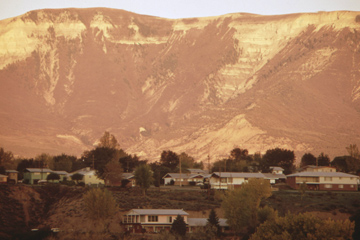
By Erica Matich | University Communications
AURORA, Colo. - A cancer diagnosis can be devastating. Surviving the disease requires months, sometimes years, of grueling treatments and life-saving therapies that can have long-lasting effects on the quality of life of a survivor and his/her family. Breast cancer survivors in rural areas have some distinct challenges when it comes to follow-up care and resources to maintain their health and address their concerns about life as cancer survivors.
SHARE (Survivors Health and Rural Experiences) is a three-year R15 study funded by NIH's National Institute for Nursing Research. It is currently being conducted in rural Colorado to examine, from the perspective of survivors and their health providers, what it means to be a long-term survivor in the rural setting and how this influences quality of life and cancer survivorship outcomes. Investigators conducted focus groups with breast cancer survivors five years beyond their cancer diagnosis and treatment, and individual interviews with formal and informal rural health care providers to these women.
The survivors and providers involved in the SHARE study live in the communities of Alamosa, Cortez, Dolores, Dove Creek, Durango, Mancos, Montrose, Pagosa Springs, La Junta, Ordway and Cheyenne Wells.
Leli Pedro, RN, DNSc, OCN, CNE, University of Colorado Cancer Center investigator, and SHARE's principal investigator, is hearing that survivorship in rural areas requires something these women and their providers already possess as rural dwellers – context relevant adaptability.
"Life in a rural setting requires everyone to be resourceful. In that respect, drawing out individual, social, and cultural insights from survivors and providers in the study provide 'on the ground' data that informs theory and practice towards enhancing cancer survivorship in rural communities," says Pedro, who is also an assistant professor at the University of Colorado College of Nursing. "These women are proactive and "do for each other". They do their homework, critically explore their options, and then share what they've learned, for better or worse, with other survivors and health care providers in their communities."
Access to health care, particularly specialty care, for active treatment and follow up can be a challenge for survivors in rural Colorado. A visit with the doctor, nurse practitioner, pharmacist or behavioral health provider often requires purposeful planning to accommodate long distances and Colorado's geography and weather to their already full lives.
Pedro says long-term survivors are generally well-informed and their health care providers are receptive but may not be aware of the specials needs of breast cancer survivors. For example, some women will experience a condition known as lymphedema, swelling of a limb due to the removal of lymph nodes. Other survivors will experience side-effects from radiation and/or chemotherapy that complicate existing health issues and ongoing health promotion efforts. Many will experience psychosocial side effects such as anxiety and/or depression. Primary care physicians may not be as familiar and prepared as oncologists to address the specific health needs of individuals with a history of cancer. As the number of individuals with a history of any type of cancer continues to steadily grow this is a gap that will need to be addressed. This is especially true in rural areas where resources are more primary care focused and specialty follow up care may be more challenging.
That is where CU Cancer Center investigator Linda Overholser, MD, MPH, comes in. Overholser is part of a team that just received a $1.5 million R25 cancer education grant from the National Institutes of Health to educate primary care providers and practices in eastern rural Colorado about the special needs of cancer survivors. Instead of breast cancer survivors in Southwestern Colorado, this team will work with community members and dozens of primary care practices on the Eastern Plains that are part of the High Plains Research Network.
"I am excited to take the work Leli has done that reinforces the need to empower cancer survivors and their health providers in meaningful ways within their communities," says Overholser.
Once a person is finished with cancer treatment and has moved on to the next step in their cancer journey, they may feel uncomfortable transitioning from their oncologists back to primary care and may experience a tremendous amount of anxiety. Overholser and her colleagues will work with a scientific advisory board, composed of faculty from the Cancer Center, and a community advisory board, composed of individuals who live and work in the eastern plains of Colorado, to develop a curriculum for cancer survivorship in primary care based on recommendations from the Institute of Medicine and experts in the field of cancer survivorship. The curriculum will be geared not only towards primary care physicians but the entire primary care practice staff to help them identify cancer survivors and begin to address their needs. The approach is based on a model successfully implemented in the High Plains Research Network previously for asthma education.
"This (practice based cancer survivorship education) is uncharted territory so we anticipate it will take about 12 months to develop the curriculum," Overholser says. "One of the strengths of this study is the amount of resources being devoted to community engagement through the High Plains Research Network. The Community Advisory Board and support of a community liaison are innovative ways to engage people who may have some great ideas about reaching physicians and the patients who may benefit."
Contact: erica.matich@ucdenver.edu
